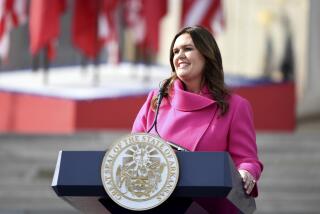More Workers Going Without Health Benefits
- Share via
WASHINGTON — The economy started creating jobs again last year, but the number of working-age adults who went without health insurance for more than a year jumped sharply, the government reported Wednesday.
An additional 2.6 million people ages 18 to 64 were uninsured for more than a year, raising the total to 24.5 million, according to the federal Centers for Disease Control and Prevention.
The report, released by the agency’s National Center for Health Statistics, is the government’s first statistical look at health insurance coverage during 2003, when the economy began reversing the job losses that started with the 2001 recession.
The increase in the number of long-term uninsured, which Robin A. Cohen of the statistics center called “quite a significant jump,” underscored the chronic nature of the problem and the decreasing likelihood that a job guaranteed access to health insurance, analysts said.
“As we lose jobs in the manufacturing sector to jobs in the service economy and small businesses, we’re losing the stability of big employers and replacing it with a much more fragile system,” said Diane Rowland, executive director of the Kaiser Commission on Medicaid and the Uninsured. “Our uninsured problem is becoming more of a permanent problem instead of a temporary, transitional problem.”
Kate Sullivan Hare, executive director of health policy for the U.S. Chamber of Commerce, said rising healthcare costs were making it more difficult for employers of all sizes to offer coverage to workers. As businesses that still offer health insurance pass on more of the costs to employees, greater numbers of workers are deciding that the coverage is not worth the cost, she said.
Health insurance premiums that employed Americans pay for family coverage have increased by almost 50% over the last three years, according to the Kaiser Family Foundation, and voters questioned in public opinion polls consistently cited rising healthcare costs and worries about losing health coverage among their top concerns.
About 20 million U.S. families, or 1 in 7, had difficulty paying their medical bills last year, according to a report this week by the Center for Studying Health System Change.
A higher number of Americans without health insurance for a year or more also means that more people are dying prematurely, “living with greater health risks, more serious illness and a greater burden on society to care for them,” Rowland said.
The CDC study determined that 53.1 million Americans of all ages, or 18.6% of the population, went without health coverage for some part of 2003, a slight increase from 2002. Of those, 28.5 million, or 10% of the population, had been uninsured for more than a year.
The one bright spot in the report was a decline in the number of uninsured children. Thanks to the success of the State Children’s Health Insurance Program, created by Congress in 1997, the percentage of children who were uninsured for some part of the year declined from 14.6% in 2002 to 13.7% in 2003.
With private insurance increasingly unaffordable for employers and workers, the campaigns of President Bush and Sen. John F. Kerry of Massachusetts, the presumed Democratic presidential nominee, are seeking to address the issue.
“This report is a stunning indictment of George Bush’s failure to deal with the healthcare crisis that is occurring on his watch,” Kerry campaign spokesman Phil Singer said.
The Bush campaign did not respond to a request for comment.
More to Read
Inside the business of entertainment
The Wide Shot brings you news, analysis and insights on everything from streaming wars to production — and what it all means for the future.
You may occasionally receive promotional content from the Los Angeles Times.










